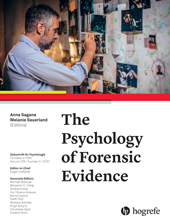Mock Jury and Juror Responses to Uncharged Acts of Sexual Misconduct
Advances in the Assessment of Unfair Prejudice
Abstract
Abstract. Internationally, admissible incriminating evidence of uncharged acts by the accused is presumed unfairly prejudicial, and remains controversial. In an experimental study, 325 jury-eligible citizens were randomly assigned to a simulated trial in which the accused faced two charges. Juries were exposed to no evidence of uncharged acts or prejudicial evidence describing four uncharged sexual acts by the accused reported by the complainant or two independent witnesses. Jury inferences about the accused’s sexual interest in children and his criminal intent were logically related to the source and type of evidence. While ratings of the likelihood of culpability increased with evidence of uncharged acts, juries were reluctant to convict solely on the basis of the complainant’s word. Jury deliberations disclosed that prejudicial evidence did not induce impermissible reasoning or a lower threshold of proof. Multiple convergent measures revealed little danger of unfair prejudice to the accused.
References
. (1985). Evidence. (Interim Report No 26)
(2017). Mock juror sampling issues in jury simulation research: A meta-analysis. Law & Human Behavior, 41, 13–28. https://doi.org/10.1037/lhb0000223
. (2020, January 31). Harvey Weinstein trial: Accuser says “No” was a trigger for him. Retrieved from https://www.bbc.com/news/world-us-canada-51324741
(2010). Asymmetries in prior conviction reasoning: Truth suppression effects in child protection contexts. Psychology, Crime & Law, 16, 211–231. https://doi.org/10.1080/10683160802612916
(2015). Jury decision making: The state of the science. New York, NY: New York University Press.
(2014). Do they matter? A meta-analytic investigation of individual characteristics and guilt judgments. Psychology, Public Policy, & Law, 20, 109–134. https://doi.org/10.1037/law0000006
(2016). Jury reasoning in separate and joint trials of institutional child sexual abuse: An empirical study. Sydney, Australia: Royal Commission into Institutional Responses to Child Sexual Abuse.
(2019). The significant probative value of tendency evidence. Melbourne University Law Review, 42, 506–550.
(2010). The weirdest people in the world. Brain and Behavioral Science, 33, 61–83. https://doi.org/10.1017/S0140525X0999152X
(2012). Admitting evidence of a defendant’s previous conviction (PCE) and its impact on juror deliberation in relation to both juror-processing style and juror concerns over the fairness of introducing PCE. Legal & Criminological Psychology, 17, 360–379. https://doi.org/10.1111/j.2044-8333.2011.02019.x
(1986). Prejudicial joinder of multiple offenses: Relative effects of cognitive processing and criminal schema. Basic and Applied Social Psychology, 7, 243–258. https://doi.org/10.1207/s15324834basp0704_1
(1980). A comparison of verdicts obtained in severed and joined criminal trials. Journal of Applied Social Psychology, 10, 444–456. https://doi.org/10.1111/j.1559-1816.1980.tb00723.x
(2004). How jurors use and misuse character evidence. Journal of Applied Psychology, 89, 347–361. https://doi.org/10.1037/0021-9010.89.2.347
. (2009). Bench Books. Retrieved from https://www.judcom.nsw.gov.au/bench-books
(2019). She said: Breaking the sexual harassment story that helped ignite a movement. London, UK: Bloomsbury.
(1979). Independence of multiple verdicts within a trial by mock jurors. Representative Research in Social Psychology, 10, 16–27.
. (2014).
. (2010).
(2011). The devastating impact of prior crimes. Journal of Criminal Law & Criminology, 101, 493–528. https://doi.org/0091-4169/11/10102-0493
(2013). Empirical fallacies of evidence law: A critical look at the admission of prior sex crimes. University of Cincinnati Law Review, 81, 795–838.
(2008). Individual differences in attitudes relevant to juror decision making: Development and validation of the Pretrial Juror Attitude Questionnaire (PJAQ). Journal of Applied Social Psychology, 38, 2010–2028. https://doi.org/10.1111/j.1559-1816.2008.00378.x
(2009). Predicting guilt judgments and verdict change using a measure of pretrial bias in a videotaped mock trial with deliberating jurors. Psychology, Crime & Law, 15, 619–634. https://doi.org/10.1080/10683160802477757
(2006). The impact of joinder and severance on federal criminal cases: An empirical study. Vanderbilt Law Review, 59, 347–404.
(2000). A modern approach to evidence: Text, problems, transcripts and cases (4th ed.). Eagan, MN: West,
American Casebook Series .(2000). The effects on juries of hearing about the defendant’s previous criminal record: A simulation study. Criminal Law Review, 2000, 734–755.
(2000). The effect of jury deliberations on jurors’ propensity to disregard inadmissible evidence. Journal of Applied Psychology, 85, 932–939. https://doi.org/10.1037/0021-9010.85.6.932
(1999). The effect of juror deliberations on jurors’ reasoning skills. Law & Human Behavior, 23, 557–575. https://doi.org/10.1023/A:1022348229558
McFarlane, U. (Director) (2019). Untouchable [Film]. Lightbox.(2008). Trial Characteristics Survey. Brisbane, Australia: University of Queensland.
(2007). A fair trial for the worst of crimes. Thesis submitted in partial fulfillment of the requirements of the King Scholar Program, Michigan State University College of Law, East Lansing, Michigan
(2016). Public attitudes towards sex offenders and their relationship to personality traits and demographic characteristics. Behavioral Sciences & the Law, 28, 832–849. https://doi.org/10.1002/bsl.959
(2018). Modelling the effects of crime type and evidence on judgments about guilt. Nature Human Behaviour, 2, 856–866. https://doi.org/10.1038/s41562-018-0451-z
(2016). The psychological foundations of evidence law. New York, NY: New York University Press.
(1985). Decision making processes in joined criminal trials. Criminal Justice & Behavior, 12, 367–385. https://doi.org/10.1177/0093854885012003006
(1985). Decision making in joined criminal trials: The influence of charge similarity, evidence similarity, and limiting instructions. Law & Human Behaviour, 9, 319–337. https://doi.org/10.1007/BF01044474



